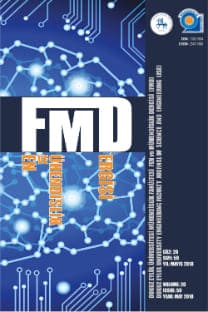Hızlı Tren Geçişine Maruz Kalan Viyadüklerin Etkin Mod Şekilleri
viyadük, mod şekli, sonlu elemanlar metodu, Wilson-theta metodu, tren
Effective Mode Shapes of Viaducts Subjected to High-speed Train
viaduct mode shape, , finite element method, Wilson-theta method, train,
___
- Su, D., Fujino, Y., Nagayama, T., Hernandez, J. Y., Seki, M. 2010. Vibration of reinforced concrete viaducts under high-speed train passage: Measurement and prediction including train-viaduct interaction, Structures and Infrastructures Engineering, vol. 6, no. 5, pp. 621–633, 2010, DOI: 10.1080/15732470903068888.
- Lou, P., Dai, G. L., Zeng Q. Y. 2005. Modal coordinate formulation for a simply supported bridge subjected to a moving train modelled as two-stage suspension vehicles, Proceedings of the Institution of Mechanical Engineers, Part C: Journal of Mechanical Engineering Science, vol. 219, no. 10, pp. 1027–1040. DOI: 10.1243/095440605X31940.
- Duan, Y. F., Wang, S. M., Wang, R. Z., Wang, C. Y., Shih, J. Y., Yun, C. B., 2018. Vector Form Intrinsic Finite-Element Analysis for Train and Bridge Dynamic Interaction, Journal of Bridge Engineering, vol. 23, no. 1, pp. 1–15. DOI: 10.1061/(ASCE)BE.1943-5592.0001171.
- Hubbell, D., Gauvreau, P. 2018. Frequency Domain Analysis of Train – Guideway Interaction Dynamics, Journal of Structural Engineering, vol. 144, no. 8, pp. 1–11. DOI: 10.1055/s-0035-1570321.
- Wu, Y. S., Yang, Y.-B. 2003. Steady-state response and riding comfort of trains moving over a series of simply supported bridges, Engineering Structures, vol. 25, no. 2, pp. 251–265. DOI: 10.1016/S0141-0296(02)00147-5.
- Youcef, K., Sabiha, El Mostafa, T., D., Ali, D., Bachir, M. 2013. Dynamic analysis of train-bridge system and riding comfort of trains with rail irregularities, Journal of Mechanical Science and Technology, vol. 27, no. 4, pp. 951–962, DOI: 10.1007/s12206-013-0206-8.
- Biondi, B., Muscolino, G., Sofi, A. 2005. A substructure approach for the dynamic analysis of train-track-bridge system, Computers and Structures, vol. 83, no. 28-30 SPEC. ISS., pp. 2271–2281. DOI: 10.1016/j.compstruc.2005.03.036.
- Xiang, T., Zhao, R., Xu, T. 2007. Reliability Evaluation of Vehicle–Bridge Dynamic Interaction, Journal of Structural Engineering, vol. 133, no. 8, pp. 1092–1099, 2007. DOI: 10.1061/(ASCE)0733-9445(2007)133:8(1092).
- Yang, Y.-B., Yau, J.-D., Hsu, L.-C. 1997. Vibration of simple beams due to trains moving at high speeds, Engineering Structures, vol. 19, no. 11, pp. 936–944. DOI: http://dx.doi.org/10.1016/S0141-0296(97)00001-1.
- Lin, C. C., Wang, J. F., Chen, B. L. 2005. Train-Induced Vibration Control of High-Speed Railway Bridges Equipped with Multiple Tuned Mass Dampers, Journal of Bridge Engineering, vol. 10, no. 4, pp. 398–414. DOI: 10.1061/(ASCE)1084-0702(2005)10:4(398).
- Demirtas, S., Ozturk, H., Sabuncu, M. 2019. Dynamic Response of Multi-bay Frames Subjected to Successive Moving Forces,” International Journal of Structural Stability and Dynamics, vol. 19, no. 4, pp. 1–24, DOI: 10.1142/S0219455419500421.
- Bathe, K.-J. 1996 Finite Element Procedures. Prentice Hall, Upper Saddle River, New Jersey.
- Yang, Y.-B., Chang, C., Yau, J. 1999. An Element for Analysing Vehicle Bridge Systems Considering Vehicle’s Pitching Effect, International Journal for Numerical Methods in Engineering, no. 46, pp. 1031–1047.
- ISSN: 1302-9304
- Yayın Aralığı: Yılda 3 Sayı
- Başlangıç: 1999
- Yayıncı: Dokuz Eylül Üniversitesi Mühendislik Fakültesi
Mikrokapsül içeren asfalt malzemelerin özelliklerinin Araştırılması
Aylin ZİYLAN, Burak ŞENGÖZ, Ali TOPAL, Amir ONSORİ
Koni Penetrasyon Testi (CPT) İle USCS Zemin Sınıfının Belirlenmesi ve Değerlendirilmesi
İbrahim ÇOBANOĞLU, SEFER BERAN ÇELİK
Malahit yeşili boyar maddesinin çam kozalağı ile adsorpsiyonunun Taguchi metodu ile incelenmesi
Manyetik özellikli desteklenmiş heterojen katalizörlerin hazırlanması ve karakterizasyonu
Mürüvvet YURDAKOÇ, Yıldıray ALDEMİR, Elif ANT BURSALI
Muhammed İkbal TORTUMLUOĞLU, Mustafa DOĞAN
Anlık Sorgu Geri-Getirimi Test Veri Kümesi Hazırlamak İçin Bir Web Aracı
Tayfun Burak AKTÜRK, İlker KOCABAŞ
A Deep Learning-Based Hotel Image Classifier for Online Travel Agencies
FATMA BOZYİĞİT, Alperen TAŞKIN, Kadir AKAR, DENİZ KILINÇ
Elektronik Devrelerin Nakış İşlemi ile Kumaş Yüzeylerine Uygulanması
Oktay PAMUK, ESRA ZEYNEP YILDIZ
Seda DURUKAN, Celalettin ŞİMŞEK, Serhat TONKUL, Alper BABA, Gökmen TAYFUR
